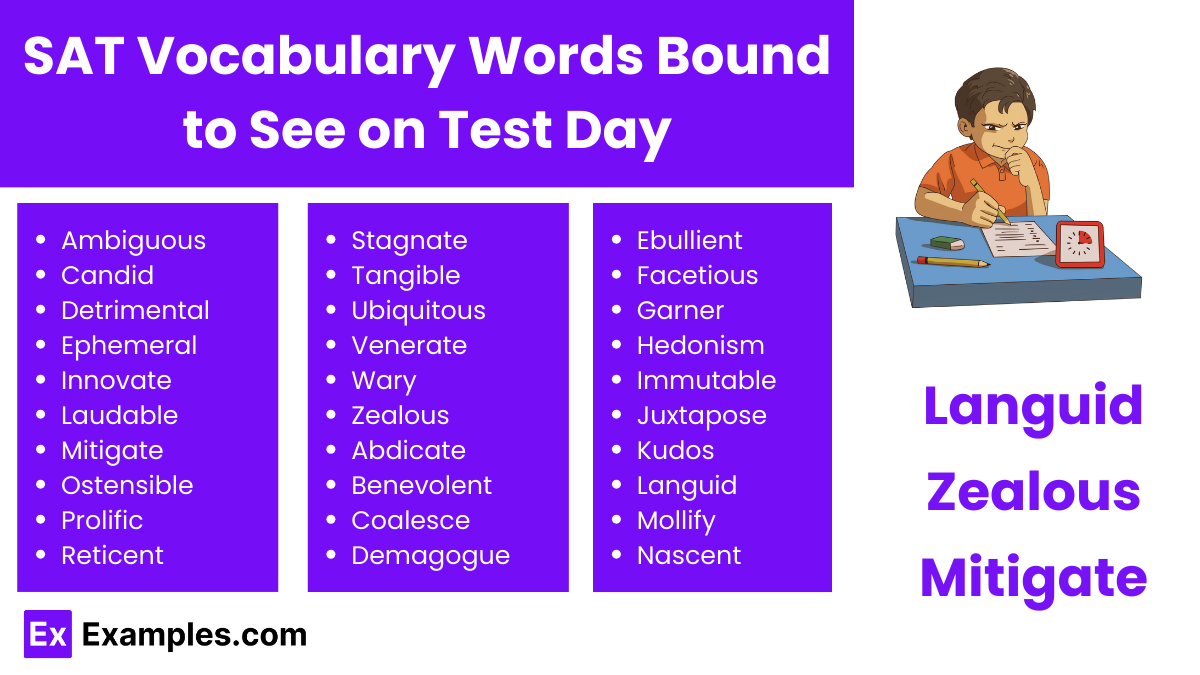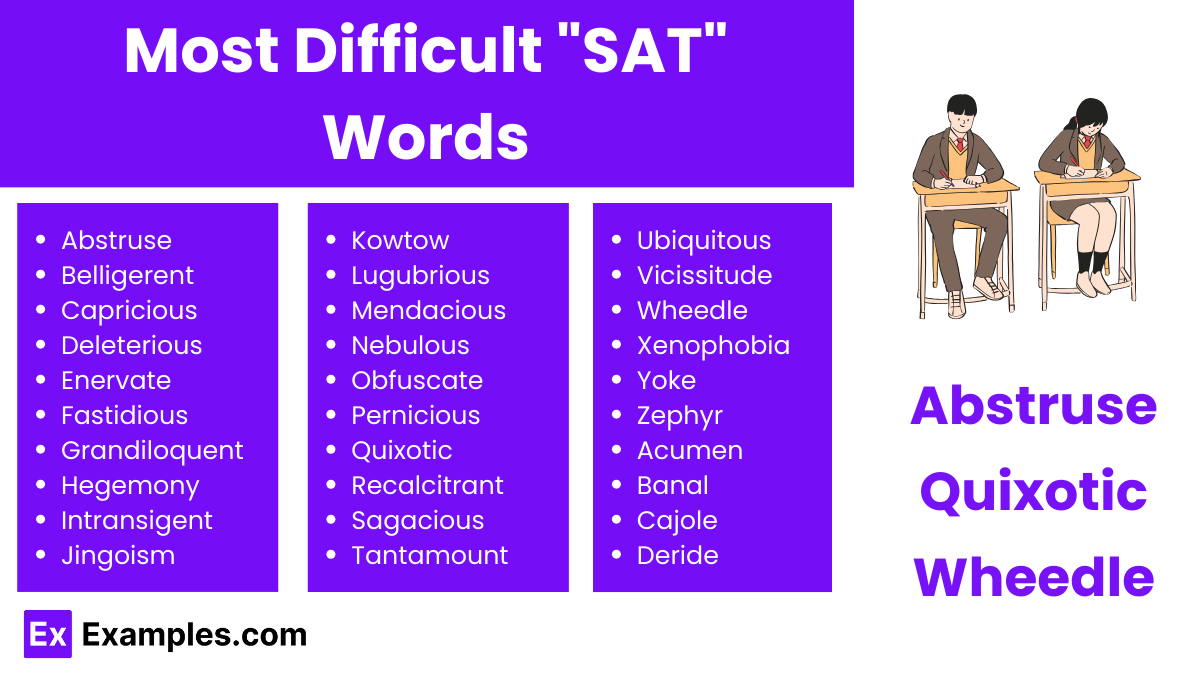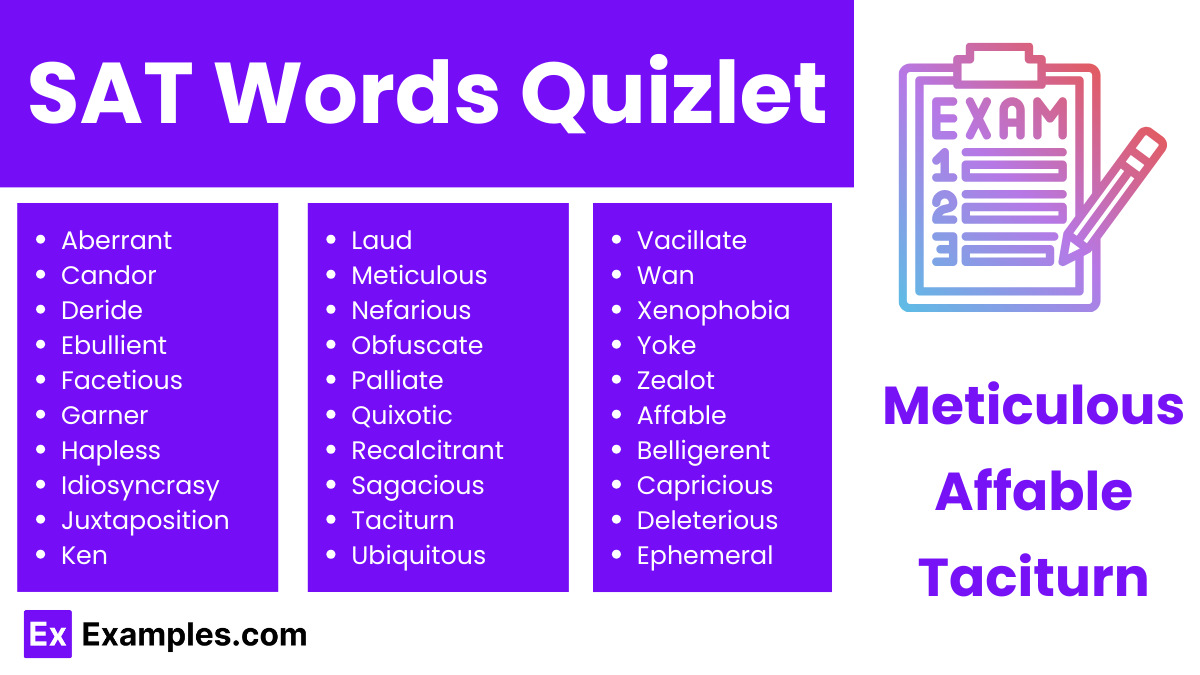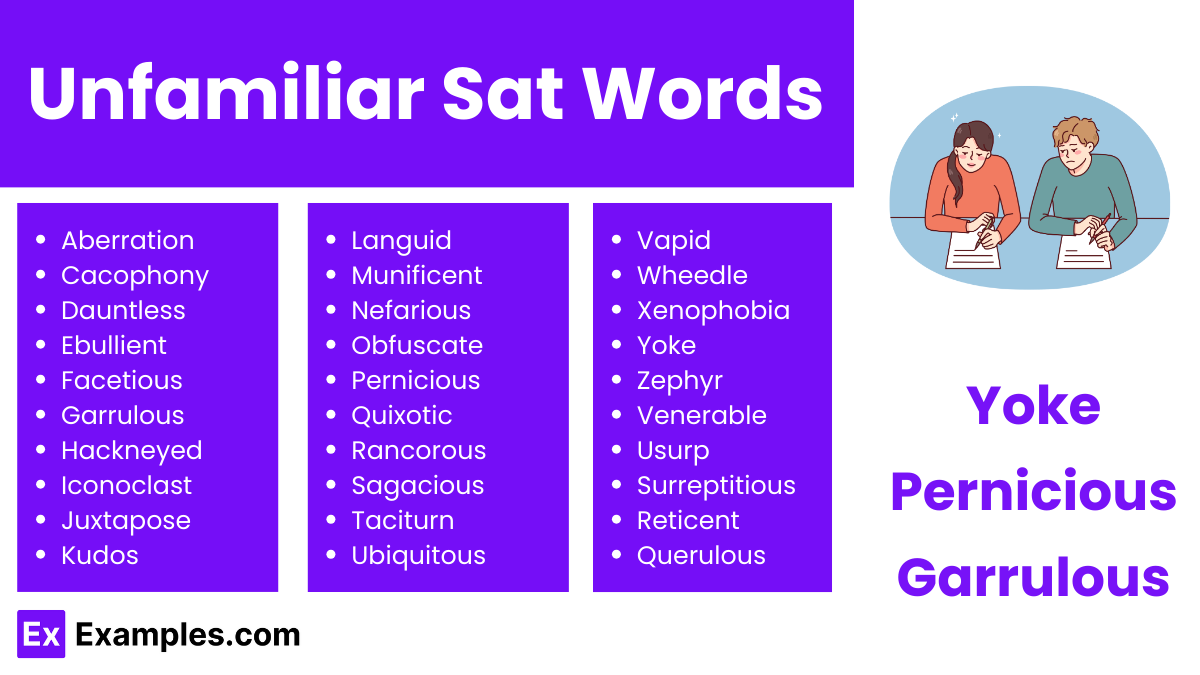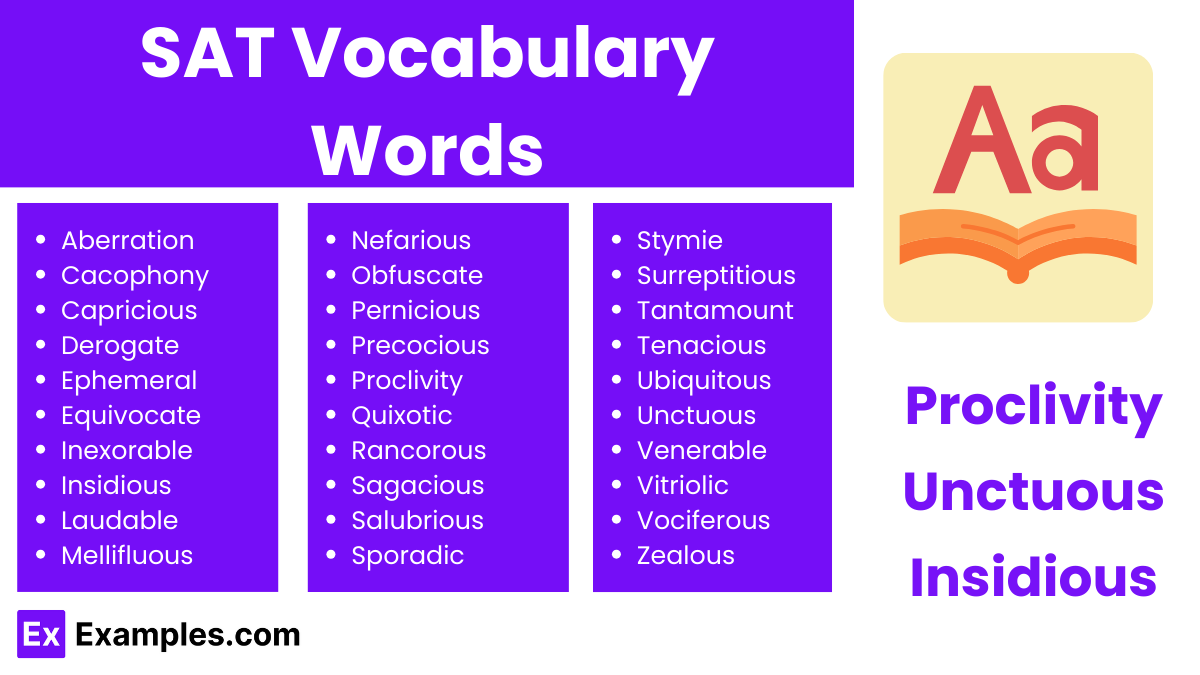450+ Sat Words List, Meaning, PDF
Embarking on the journey to conquer the SAT requires not just diligence but also a strategic approach to mastering vocabulary. The SAT words list encompasses a broad range of sophisticated vocabulary that challenges even the most avid readers. Understanding these words in context can significantly boost your test scores, enhancing your reading comprehension, writing clarity, and eloquence in expression. Our guide to SAT words provides essential examples, making it easier for you to grasp and apply these complex terms. Dive into this resource to elevate your preparation and step confidently into exam day, armed with a powerful command of the English language.
Most Commonly used a Sat Words
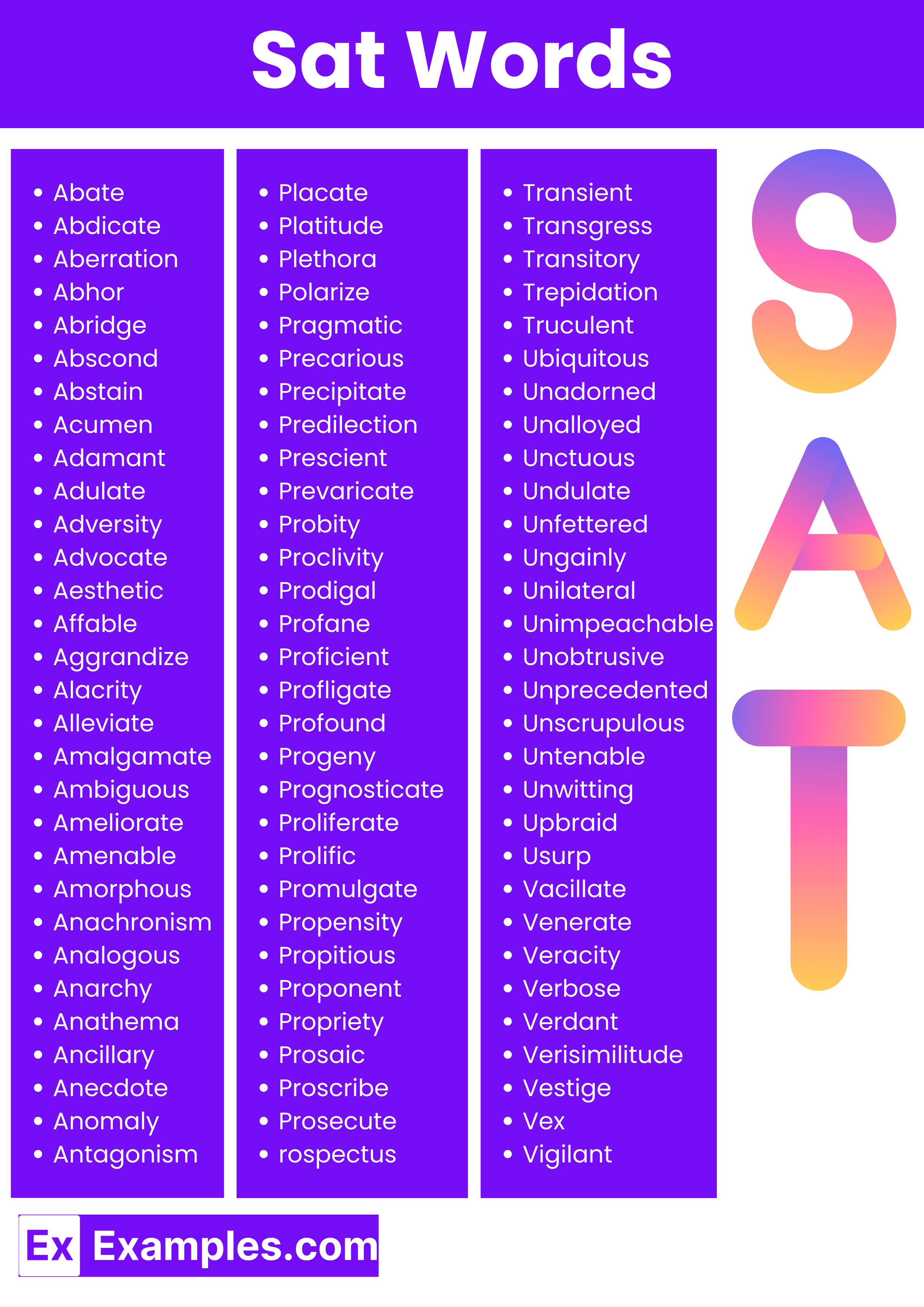
The SAT is a critical stepping stone in your academic journey, where your vocabulary plays a pivotal role in determining your score. Excelling in the SAT requires more than just understanding concepts; it demands a command over a vast array of words that the test frequently employs. These words are carefully selected to assess a student’s ability to comprehend, analyze, and articulate ideas effectively. A robust vocabulary not only aids in tackling the reading and writing sections but also instills confidence in students, empowering them to express complex thoughts with precision.
| Abate | Inundate | Placate | Sanctimonious | Transient | Prolific |
| Abdicate | Inure | Platitude | Scrupulous | Transgress | Prosaic |
| Aberration | Irascible | Plethora | Scrutinize | Transitory | Proscribe |
| Abhor | Juxtapose | Polarize | Sectarian | Trepidation | Providential |
| Abridge | Kinetic | Pragmatic | Sedentary | Truculent | Puerile |
| Abscond | Laconic | Precarious | Segregate | Ubiquitous | Pugnacious |
| Abstain | Languid | Precipitate | Serendipity | Unadorned | Pulchritude |
| Acumen | Lassitude | Predilection | Sinecure | Unalloyed | Punctilious |
| Adamant | Laudable | Prescient | Singular | Unctuous | Querulous |
| Adulate | Lavish | Prevaricate | Solicitous | Undulate | Quixotic |
| Adversity | Lethargic | Probity | Solvent | Unfettered | Rancorous |
| Advocate | Levity | Proclivity | Soporific | Ungainly | Rapport |
| Aesthetic | Logorrhea | Prodigal | Specious | Unilateral | Raze |
| Affable | Loquacious | Profane | Specter | Unimpeachable | Recalcitrant |
| Aggrandize | Lucid | Proficient | Spectrum | Unobtrusive | Recapitulate |
| Alacrity | Luminous | Profligate | Speculate | Unprecedented | Recondite |
| Alleviate | Malfeasance | Profound | Sporadic | Unscrupulous | Rectitude |
| Amalgamate | Malleable | Progeny | Spurious | Untenable | Redolent |
| Ambiguous | Maverick | Prognosticate | Squalid | Unwitting | Refractory |
| Ameliorate | Mendacious | Proliferate | Squander | Upbraid | Refulgent |
| Amenable | Mercurial | Prolific | Stagnate | Usurp | Regale |
| Amorphous | Metamorphose | Promulgate | Staid | Vacillate | Relegate |
| Anachronism | Meticulous | Propensity | Staunch | Venerate | Remiss |
| Analogous | Mitigate | Propitious | Steadfast | Veracity | Renounce |
| Anarchy | Modicum | Proponent | Stigmatize | Verbose | Reproach |
| Anathema | Mollify | Propriety | Stipulate | Verdant | Repudiate |
| Ancillary | Morose | Prosaic | Stoic | Verisimilitude | Rescind |
| Anecdote | Mundane | Proscribe | Stolid | Vestige | Resilient |
| Anomaly | Munificent | Prosecute | Strident | Vex | Resolute |
| Antagonism | Myopic | Prospectus | Strife | Vigilant | Resplendent |
| Antipathy | Myriad | Prosperity | Stringent | Vilify | Restitution |
| Apathy | Nascent | Protagonist | Subjugate | Vindicate | Reticent |
| Apocryphal | Nefarious | Protean | Sublime | Vindictive | Reverent |
| Appease | Negligent | Protract | Substantiate | Virtuoso | Rhapsodize |
| Apprehend | Nostalgia | Prowess | Subtle | Vitriolic | Ribald |
| Arable | Notorious | Prudent | Succinct | Vituperate | Rife |
| Arbitrary | Nuance | Pugnacious | Suffrage | Vivacious | Rigorous |
| Arcane | Nullify | Pulchritude | Supercilious | Vociferous | Risible |
| Arduous | Obdurate | Punctilious | Superfluous | Volatile | Rudimentary |
| Articulate | Obfuscate | Querulous | Supplant | Voracious | Rueful |
SAT Vocabulary Words Bound to See on Test Day
The SAT test is notorious for its challenging vocabulary section, which can be a make-or-break for many students aiming for top scores. Knowing which words are frequently tested can give you a significant advantage. This guide highlights SAT vocab words that are bound to appear on test day, providing you with not just the words but also their meanings and how to use them in sentences. By familiarizing yourself with these terms, you’ll be better prepared to tackle the reading comprehension and writing sections, enhancing your overall performance. Each entry includes a bolded word, its definition, and an example sentence to illustrate its proper use, ensuring you grasp the full context in which these words are often found.
- Ambiguous – Open to more than one interpretation; not having one obvious meaning.
- Example Sentence: The ending of the novel was intentionally ambiguous, leaving readers to draw their own conclusions.
- Candid – Truthful and straightforward; frank.
- Example Sentence: Her candid remarks about the company’s direction sparked a lively debate among the board members.
- Detrimental – Tending to cause harm.
- Example Sentence: Skipping classes can be detrimental to your grades and overall academic performance.
- Ephemeral – Lasting for a very short time.
- Example Sentence: The beauty of an ephemeral bloom is captivating, though it fades quickly.
- Innovate – Make changes in something established, especially by introducing new methods, ideas, or products.
- Example Sentence: The company aims to innovate the tech industry with its groundbreaking new device.
- Laudable – Deserving praise and commendation.
- Example Sentence: Her laudable efforts to improve community health have been recognized by several organizations.
- Mitigate – Make less severe, serious, or painful.
- Example Sentence: The government took steps to mitigate the economic impact of the pandemic.
- Ostensible – Stated or appearing to be true, but not necessarily so.
- Example Sentence: The ostensible reason for his visit was business, but he also wanted to see his family.
- Prolific – (of a plant, animal, or person) producing much fruit or foliage or many offspring; (of an artist, author, or composer) producing many works.
- Example Sentence: The prolific author released yet another best-selling novel this year.
- Reticent – Not revealing one’s thoughts or feelings readily.
- Example Sentence: Despite being reticent about her personal life, she shared her experiences to help others in similar situations.
- Stagnate – To stop developing, progressing, moving, etc.; become inactive or dull.
- Example Sentence: Without innovation, the industry will stagnate and eventually lose to competitors.
- Tangible – Perceptible by touch.
- Example Sentence: The results of the experiment were tangible, proving the theory beyond a doubt.
- Ubiquitous – Present, appearing, or found everywhere.
- Example Sentence: Smartphones have become ubiquitous, with almost everyone owning one.
- Venerate – Regard with great respect; revere.
- Example Sentence: Many cultures venerate their ancestors, honoring them with rituals and ceremonies.
- Wary – Feeling or showing caution about possible dangers or problems.
- Example Sentence: She was wary of making the investment, aware of the risks involved.
- Zealous – Having or showing zeal; passionate.
- Example Sentence: The campaign’s volunteers were zealous, working tirelessly to reach their goals.
- Abdicate – (of a monarch) renounce one’s throne.
- Example Sentence: Faced with overwhelming opposition, the king decided to abdicate the throne in favor of his heir.
- Benevolent – Well meaning and kindly.
- Example Sentence: The benevolent donor contributed funds to build the new community center.
- Coalesce – Come together to form one mass or whole.
- Example Sentence: Over time, the scattered communities began to coalesce into a single, cohesive society.
- Demagogue – A political leader who seeks support by appealing to the desires and prejudices of ordinary people rather than by using rational argument.
- Example Sentence: The senator warned against the rise of demagogues who exploited people’s fears for their own gain.
- Ebullient – Cheerful and full of energy.
- Example Sentence: She was ebullient at the news of her acceptance into her first-choice university.
- Facetious – Treating serious issues with deliberately inappropriate humor; flippant.
- Example Sentence: His facetious comments during the meeting were not well-received by everyone.
- Garner – Gather or collect (something, especially information or approval).
- Example Sentence: The researcher was able to garner significant data from the experiment.
- Hedonism – The pursuit of pleasure; sensual self-indulgence.
- Example Sentence: The philosophy of hedonism suggests that finding happiness is the highest good.
- Immutable – Unchanging over time or unable to be changed.
- Example Sentence: The laws of physics are considered immutable, constant throughout the universe.
- Juxtapose – Place or deal with close together for contrasting effect.
- Example Sentence: The exhibition juxtaposes modern art with classical pieces to show the evolution of styles.
- Kudos – Praise and honor received for an achievement.
- Example Sentence: She received kudos from everyone on her team for her successful project management.
- Languid – Displaying or having a disinclination for physical exertion or effort; slow and relaxed.
- Example Sentence: The languid pace of the small village was a welcome change from the hustle of the city.
- Mollify – Appease the anger or anxiety of (someone).
- Example Sentence: The manager was able to mollify the upset customer with a sincere apology and a discount.
- Nascent – (especially of a process or organization) just coming into existence and beginning to display signs of future potential.
- Example Sentence: The nascent technology has the potential to revolutionize the way we live.
Most Difficult “SAT” Words
Preparing for the SAT is a journey filled with challenges, especially when it comes to mastering the vocabulary section. Among the vast array of words that students must learn, some stand out for their complexity and rarity. These most difficult “SAT” words often test the depth of a student’s vocabulary, understanding, and application skills. Mastery of these words can significantly impact your SAT score, showcasing your ability to navigate through complex texts and nuanced language.
- Abstruse – difficult to understand; obscure.
- Belligerent – hostile and aggressive.
- Capricious – given to sudden and unaccountable changes of mood or behavior.
- Deleterious – causing harm or damage.
- Enervate – cause (someone) to feel drained of energy or vitality; weaken.
- Fastidious – very attentive to and concerned about accuracy and detail.
- Grandiloquent – pompous or extravagant in language, style, or manner, especially in a way that is intended to impress.
- Hegemony – leadership or dominance, especially by one country or social group over others.
- Intransigent – unwilling or refusing to change one’s views or to agree about something.
- Jingoism – extreme patriotism, especially in the form of aggressive or warlike foreign policy.
- Kowtow – act in an excessively subservient manner.
- Lugubrious – looking or sounding sad and dismal.
- Mendacious – not telling the truth; lying.
- Nebulous – in the form of a cloud or haze; hazy.
- Obfuscate – render obscure, unclear, or unintelligible.
- Pernicious – having a harmful effect, especially in a gradual or subtle way.
- Quixotic – exceedingly idealistic; unrealistic and impractical.
- Recalcitrant – having an obstinately uncooperative attitude towards authority or discipline.
- Sagacious – having or showing keen mental discernment and good judgment; wise or shrewd.
- Tantamount – equivalent in seriousness to; virtually the same as.
- Ubiquitous – present, appearing, or found everywhere.
- Vicissitude – a change of circumstances or fortune, typically one that is unwelcome or unpleasant.
- Wheedle – use flattery or coaxing in order to persuade someone to do something or give one something.
- Xenophobia – dislike of or prejudice against people from other countries.
- Yoke – used to refer to something that is regarded as oppressive or burdensome.
- Zephyr – a soft gentle breeze.
- Acumen – the ability to make good judgments and quick decisions, typically in a particular domain.
- Banal – so lacking in originality as to be obvious and boring.
- Cajole – persuade someone to do something by sustained coaxing or flattery.
- Deride – express contempt for; ridicule
SAT Words Quizlet
Elevate your SAT preparation with our specialized SAT Words Quizlet, tailored to enhance your vocabulary in a structured, user-friendly format. This Quizlet is designed to boost your mastery of essential SAT vocabulary, making it an indispensable tool for students aiming to achieve top scores. By focusing on a diverse array of words, this resource aids in improving your comprehension, writing, and critical thinking skills, key components of the SAT.
- Aberrant – deviating from the norm.
- Candor – honesty, straightforwardness.
- Deride – to ridicule or mock.
- Ebullient – overflowing with enthusiasm.
- Facetious – treating serious issues with deliberately inappropriate humor.
- Garner – to gather or collect.
- Hapless – unfortunate.
- Idiosyncrasy – a peculiar personality trait.
- Juxtaposition – placing two elements close together for contrasting effect.
- Ken – range of knowledge.
- Laud – to praise highly.
- Meticulous – showing great attention to detail.
- Nefarious – wicked or criminal.
- Obfuscate – to deliberately make something difficult to understand.
- Palliate – to make less severe without removing the cause.
- Quixotic – exceedingly idealistic; unrealistic and impractical.
- Recalcitrant – resistant to authority; uncooperative.
- Sagacious – wise; having keen perception and sound judgement.
- Taciturn – reserved or uncommunicative in speech.
- Ubiquitous – present, appearing, or found everywhere.
- Vacillate – to waver between different opinions or actions.
- Wan – pale and giving the impression of illness or exhaustion.
- Xenophobia – dislike of or prejudice against people from other countries.
- Yoke – to join together.
- Zealot – a person who is fanatical and uncompromising in pursuit of their religious, political, or other ideals.
- Affable – friendly, good-natured, or easy to talk to.
- Belligerent – hostile and aggressive.
- Capricious – given to sudden and unaccountable changes of mood or behavior
- Deleterious – causing harm or damage.
- Ephemeral – lasting for a very short time
Unfamiliar Sat Words
Diving into the SAT preparation, students often encounter words that are not part of their everyday vocabulary. These unfamiliar words can be daunting but mastering them can significantly boost your score. Our guide focuses on such words, aiming to expand your vocabulary horizon and prepare you for success. By integrating these terms into your study routine, you will enhance your comprehension and analytical skills, making the SAT reading and writing sections more approachable. Embrace these challenging yet rewarding words to gain an edge in your SAT preparation.
- Aberration: a deviation from what is normal or expected.
- Cacophony: a harsh, discordant mixture of sounds.
- Dauntless: showing fearlessness and determination.
- Ebullient: cheerful and full of energy.
- Facetious: treating serious issues with deliberately inappropriate humor.
- Garrulous: excessively talkative, especially on trivial matters.
- Hackneyed: lacking significance through having been overused.
- Iconoclast: a person who attacks cherished beliefs or institutions.
- Juxtapose: to place or deal with close together for contrasting effect.
- Kudos: praise and honor received for an achievement.
- Languid: displaying or having a disinclination for physical exertion or effort; slow and relaxed.
- Munificent: more generous than is usual or necessary.
- Nefarious: (typically of an action or activity) wicked or criminal.
- Obfuscate: render obscure, unclear, or unintelligible.
- Pernicious: having a harmful effect, especially in a gradual or subtle way.
- Quixotic: exceedingly idealistic; unrealistic and impractical.
- Rancorous: characterized by bitterness or resentment.
- Sagacious: having or showing keen mental discernment and good judgment; wise or shrewd.
- Taciturn: (of a person) reserved or uncommunicative in speech; saying little.
- Ubiquitous: present, appearing, or found everywhere.
- Vapid: offering nothing that is stimulating or challenging; bland.
- Wheedle: to use flattery or coaxing in order to persuade someone to do something or give one something.
- Xenophobia: dislike of or prejudice against people from other countries.
- Yoke: to join together; to link people or things together in a pair.
- Zephyr: a gentle, mild breeze.
- Venerable: accorded a great deal of respect, especially because of age, wisdom, or character.
- Usurp: take (a position of power or importance) illegally or by force.
- Surreptitious: kept secret, especially because it would not be approved of.
- Reticent: not revealing one’s thoughts or feelings readily.
- Querulous: complaining in a petulant or whining manner
SAT Vocabulary Words
Expanding your vocabulary is crucial for achieving a high score on the SAT. A strong grasp of sophisticated vocabulary not only aids in the reading comprehension section but also enhances your writing, making it more compelling and articulate. Our SAT Vocabulary List is tailored to help students familiarize themselves with the types of words that frequently appear on the exam. This list is an essential tool for test-takers aiming to elevate their scores. By incorporating these words into your study routine, you’ll improve not just your SAT performance but also your overall command of the English language. Dive into our selection of 30 key SAT vocabulary words, carefully chosen to boost your preparation and confidence for the test day.
- Aberration – a departure from what is normal or expected
- Cacophony – harsh, discordant mixture of sounds
- Capricious – given to sudden and unaccountable changes of mood or behavior
- Derogate – to diminish the reputation of someone or something
- Ephemeral – lasting for a very short time
- Equivocate – to use ambiguous language so as to conceal the truth or avoid committing oneself
- Inexorable – impossible to stop or prevent
- Insidious – proceeding in a gradual, subtle way, but with harmful effects
- Laudable – deserving praise and commendation
- Mellifluous – sweet or musical; pleasant to hear
- Nefarious – wicked or criminal
- Obfuscate – render obscure, unclear, or unintelligible
- Pernicious – having a harmful effect, especially in a gradual or subtle way
- Precocious – having developed certain abilities or proclivities at an earlier age than usual
- Proclivity – a tendency to choose or do something regularly; an inclination or predisposition towards a particular thing
- Quixotic – exceedingly idealistic; unrealistic and impractical
- Rancorous – characterized by bitterness or resentment
- Sagacious – having or showing keen mental discernment and good judgment; shrewd
- Salubrious – health-giving; healthy
- Sporadic – occurring at irregular intervals or only in a few places; scattered or isolated
- Stymie – prevent or hinder the progress of
- Surreptitious – kept secret, especially because it would not be approved of
- Tantamount – equivalent in seriousness to; virtually the same as
- Tenacious – tending to keep a firm hold of something; clinging or adhering closely
- Ubiquitous – present, appearing, or found everywhere
- Unctuous – (of a person) excessively or ingratiatingly flattering; oily
- Venerable – accorded a great deal of respect, especially because of age, wisdom, or character
- Vitriolic – filled with bitter criticism or malice
- Vociferous – vehement or clamorous
- Zealous – having or showing zeal; ferven
How Important Are SAT Vocab Words?
- Boosts Reading Comprehension: A vast vocabulary is crucial for understanding the complex texts featured in the SAT Reading section.
- Enhances Writing Quality: Knowledge of diverse words allows for more precise and expressive writing in the Essay and Writing sections.
- Increases Test Scores: Familiarity with SAT vocab can directly impact your score positively, especially in critical reading and writing.
- Improves Speed: Knowing vocabulary words beforehand saves time during the test, as less time is spent deciphering meanings.
- Aids in College Preparedness: Demonstrating a strong vocabulary indicates readiness for college-level reading and writing.
- Facilitates Effective Communication: Mastery of a rich vocabulary extends beyond the SAT, enhancing overall verbal and written communication skills.
- Builds Confidence: Entering the test with a strong vocabulary foundation can boost confidence, reducing test-day anxiety.
- Encourages Lifelong Learning: The process of expanding your vocabulary encourages habits of continual learning and curiosity
How do I Improve my SAT Vocabulary?
- Read Widely: Delve into various genres such as literature, science, and history to encounter a broad spectrum of vocabulary.
- Utilize Flashcards: Create or use online flashcards for effective active recall of words and their meanings.
- Daily Practice Tests: Engage in regular practice tests to familiarize yourself with SAT-style questions and vocabulary in context.
- Vocabulary Apps: Incorporate apps or online resources into your study plan for interactive vocabulary learning.
- Join Study Groups: Participate in study groups or online forums to share knowledge and learn from others’ insights.
- Consistency is Key: Regular and disciplined study habits are crucial for gradual and sustained vocabulary improvement.
- Language-Rich Environments: Surround yourself with English through books, podcasts, and discussions to naturally absorb new vocabulary.
- Personal Vocabulary Journal: Maintain a journal to record new words, their meanings, and example sentences.
- Teach What You Learn: Explaining new words to others can reinforce your understanding and retention.
- Set Realistic Goals: Establish daily or weekly vocabulary goals to keep your learning focused and manageable.
How to Study SAT Words Effectively: 3 Essential Tips
Studying for the SAT requires a strategic approach, especially when it comes to vocabulary. With the right techniques, mastering SAT words can become an achievable goal rather than a daunting task. Our guide offers three essential tips designed to optimize your study sessions, ensuring you retain and understand SAT vocabulary efficiently. These tips leverage proven study methods, integrating them into your prep routine to enhance recall and application. By adopting these strategies, you’ll not only boost your vocabulary skills but also gain a competitive edge in achieving a high score on the SAT.
- Contextual Learning: Instead of memorizing words in isolation, incorporate them into sentences or personal stories. This method helps in understanding the nuances of each word, making them easier to recall during the test.
- Flashcards: Utilize flashcards for active recall practice. Regularly reviewing words and their meanings through flashcards can significantly improve memory retention and recall speed.
- Practice Tests: Engage with practice tests that include vocabulary sections. This exposes you to the words in a test-like environment, allowing you to apply your knowledge under exam conditions.
Mastering unfamiliar SAT words is pivotal for test success, enriching your vocabulary and comprehension skills. Embrace these words in your preparation to navigate the SAT with confidence. Regular practice and application will transform these challenging words from daunting obstacles into familiar friends, ultimately elevating your verbal score and showcasing your linguistic prowess




